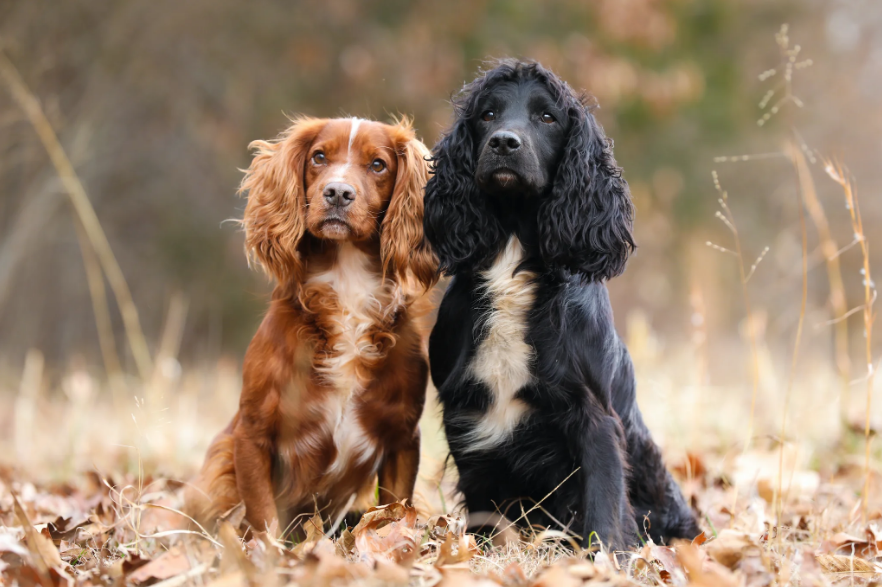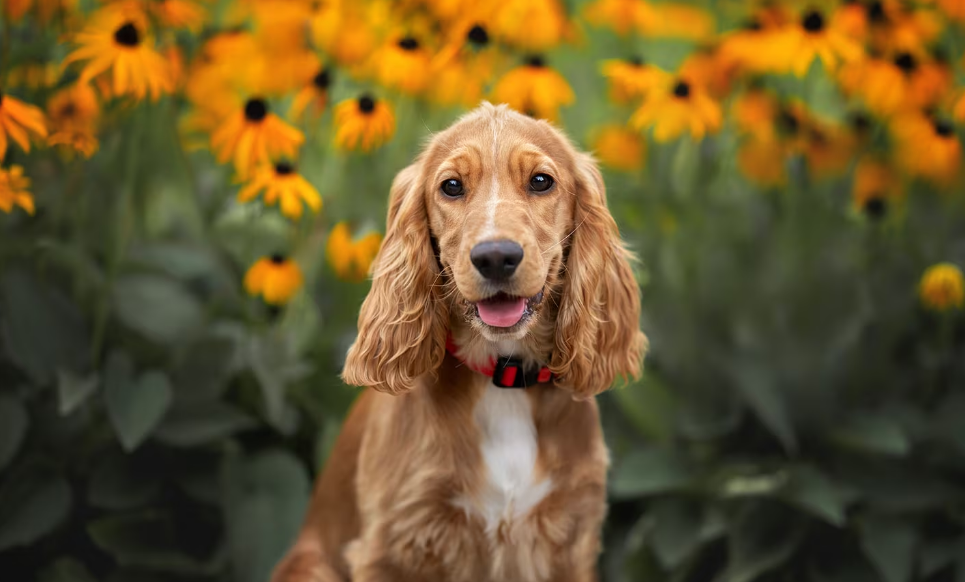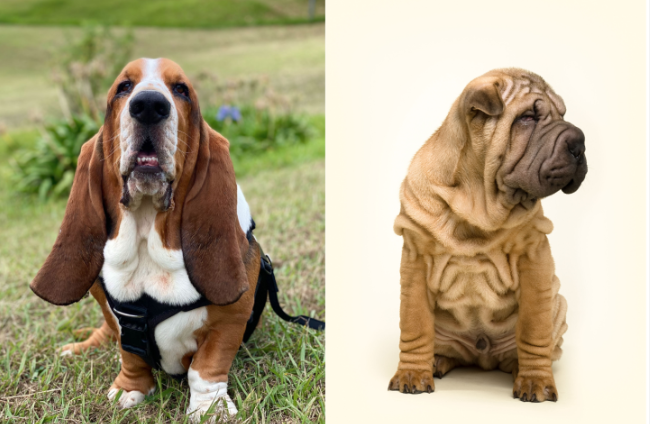Cocker Spaniel
It is believed that the Cocker Spaniel is a popular breed of dog that is known for its sociable disposition along with its smartness, intelligence, and unique appearance. There are two varieties of Cocker Spaniels namely they are the American Cocker Spaniel and the English Cocker Spaniel. Both belong to the sporting group and were initially breed for hunting birds, particularly game birds such as woodcock that is how they got their names.
Key Characteristics:
size: Cocker Spaniels are of medium size. Males are typically 15 to 17 inches around the shoulder. Females are a bit smaller.
coat: It is characterized by a smooth, medium-length coat that is available in a range of shades, including red, black, liver and a variety of parti-colors. Regular grooming is essential for preventing matting and to maintain their coat’s health.
Ears A unique characteristics of Cocker Spaniels are their earlobes that are long and pendulous. Regularly cleaning your ears is essential to avoid ear infections.
Aspects: The Cocker Spaniels have been well-known for their friendliness and soothing nature. They get along well with families as well as children and other pets. They are also smart and can be trained.
Activity Level Though they’re initially bred to be hunters, the Cocker Spaniels are excellent companions for families. They are lively and appreciate regular exercise. This includes walking on a daily basis and playing.
Intelligence Cocker Spaniels are classified as intelligent dogs, and they are generally simple to train. Positive reinforcement methods work with this breed.
Health Similar to many purebred breeds, the Cocker Spaniel can be susceptible to health problems such as hip dysplasia, ear infections and eye issues. Regular check-ups with a veterinarian are vital.
The popularity of The Cocker Spaniel has been a popular pet for a number of years, and have appeared in a variety of TV and film shows, which has contributed to their growing popularity.
Cocker Spaniel Health and Grooming
Health Considerations:
Ear Infections:
- Cocker Spaniels are famous for their pendulous, long ears, which are susceptible to infections in the ear. Check and clean regularly their ears to avoid accumulation of wax and infection.
Eye Issues:
- Cocker Spaniels are susceptible to eye problems, such as cataracts and Glaucoma. Regular eye examinations are crucial to identify and treat any problems early.
Hip Dysplasia:
- This is a very common orthopedic problem that affects a wide range of breeds of dogs, including Cocker Spaniels. Being healthy and ensuring regular, moderate exercise will benefit in preventing or managing hip dysplasia.
Skin Conditions:
- Certain Cocker Spaniels are affected by skin conditions such as allergies and hot spots. Regular grooming along with a healthy diet and prompt treatment of any skin concerns could benefit deal with these issues.
Dental Care:
- Like other breeds of dogs Cocker spaniels can be affected by dental issues. Regularly brushing their teeth and giving chewing gum can benefit maintain the health of your mouth.
Obesity:
- Cocker Spaniels may be susceptible to obesity, which could cause other health issues to worsen. Make sure they are eating healthy diets, proper portions, and consistent exercises to maintain the weight of a healthy one.

Grooming:
Coat Care:
- Cocker Spaniels have a medium-length silky coat which requires regular grooming to avoid matting and getting caught in. Cleanse their coat every few times every weekly to assure it stays neat and healthy.
Bathing:
- Bathe your dog as necessary, usually every 4 to 6 weeks, or whenever they are dirty. Choose a dog-friendly shampoo ensure that you thoroughly rinse your dog to prevent skin irritation.
Trimming:
- Regular grooming is essential particularly on the paws, ears and the tail. A lot of pet owners prefer having an skillful groomer handle this, however with the right equipment and advice, you can learn how to trim at your own home.
Nail Care:
- Cut their nails to an appropriate length. Nails that are too long can cause discomfort and hinder their gait.
Teeth Cleaning:
- Cleanse Your Cocker Spaniel’s teeth on a regular basis to avoid dental problems. Toys and chews are also able to benefit in the maintenance of your dog’s oral health.
Ear Cleaning:
- Make sure to clean their ears frequently to avoid infections. Use a veterinary-approved ear cleaner and cotton balls. Also, be gentle so as to prevent any harm to the canal of the ear.
Regular Vet Check-ups:
- Regularly schedule veterinary checks to check general health of the animal and spot any possible issues early.
Cocker Spaniel Care and Feeding
Care for your Cocker Spaniel is about providing the right diet, regular exercise grooming, veterinary attention and plenty of affection and love. Here are some tips to take care of and feed your Cocker Spaniel
1. Nutrition:
- Make sure you feed a well-balanced, high-quality dog food that is suitable to their size, age and activity level. Talk to your vet to decide on what is the desirable nutrition for your dog.
- Check their weight regularly to avoid weight gain which is a frequent problem for this breed. Make adjustments to their food intake and select the right treats to keep an appropriate weight.
2. Exercise:
- Cocker Spaniels are an active breed, and exercising regularly is vital to their mental and physical well-being. You should aim for 30 to 60 minutes of moderate activity each day that can include walks, playtime and engaging activities.
3. Grooming:
- Make sure to brush their coats at least once each week to prevent getting tangled and matting. A more frequent brushing schedule may be required during the shedding season.
- Make sure to bathe your Cocker Spaniel when necessary, typically every 4 to 6 weeks or whenever they become dirty. Choose a dog-friendly shampoo.
- Check and clean regularly their ears regularly to avoid infection.
- Trim nails as necessary to ensure a length that is comfortable.
4. Healthcare:
- Make sure to schedule regular check-ups with your veterinarian to assess the overall condition of your pet and to address any issues that could arise.
- Make sure you are up to date with your vaccinations, prevention of parasites, and dental hygiene as suggested by your veterinary doctor.
- Be alert for signs of health problems, such as changes in energy, appetite level, or behavior and seek prompt medical assistance if required.
5. Training and Mental Stimulation:
- Cocker Spaniels are intelligent dogs that love mental stimulation. They can be a great source of puzzle toys, engaging games, and even training classes to keep them active.
- Participate in obedience classes to help socialize your dog and demonstrate basic commands.
6. Socialization:
- Cocker Spaniels tend to be social however, early and continuous socialization is essential. Let them interact with different individuals, places as well as other animals to warrant that they grow up to be well-adjusted as adults.

7. Love and Attention:
- Cocker Spaniels are affectionate dogs that love human interaction. Spend moments with them, focus on providing attention, and take them along to family events.
8. Feeding Schedule:
- Divide the daily portion of food by two to three meals in order to help with digestion and avoid eating too much.
- Pick a schedule for your meals that is suited to your routine and lifestyle, but remain constant.
9. Hydration:
- Always prepare clean and fresh water to the water of your Cocker Spaniel. Be sure to monitor their intake of water especially in high temperatures or times that are active.
10. Special Considerations:
- Take note of specific health issues for breeds and discuss these with your veterinarian. For instance, Cocker Spaniels may be susceptible to eye and ear problems.
FAQs
Q What is the typical life span of the lifespan of a Cocker Spaniel?
A: The lifespan of Cocker Spaniels generally between 10 and 14 years. Individual lives can differ based on factors like diet, genetics fitness, exercise, and general maintenance.
Q Do you think Cocker Spaniels great with other pets as well as children?
A Yes Cocker Spaniels generally great with children as well as other pets. They are renowned for their friendly and social nature. Socialization at an early age is crucial for them to assure good interactions between children and animals.
Q How much exercising do Cocker Spaniels require?
Answer: Cocker Spaniels are an active breed that benefit of regular activity. Try to get at least 30 to 60 minutes of moderate activity each day. This could be played with, walks and other activities that are interactive.
Q Are Cocker Spaniels shed lots of hair?
The Cocker Spaniel shed and a regular grooming schedule is required to reduce their moderate shedding. The simple act of brushing their coats a couple of times per week helps to prevent matting and hair that is loose.
Q Do you think Cocker Spaniels simple for you to teach?
A Sure, Cocker Spaniels are generally smart and willing to please, which makes them quite easy to train. Positive reinforcement methods are effective as well as early-onset training suggested for a well-behaved dog in its adult years.
Q How often should I brush the Cocker Spaniel I have?
A Grooming regimen is a must in Cocker Spaniels. Cleanse their coat every few times each week, wash them at least every 4 to 6 weeks or whenever necessary, and maintain their ears clean to avoid infections. Professional grooming to trim their hair may be needed at least every six to eight weeks.
Q Do you have any specific health problems that are common to Cocker Spaniels?
A: Cocker Spaniels may be vulnerable to certain health problems, including eye infections, ear infections hip dysplasia, skin problems. Regular vet check-ups and regular grooming could benefit to prevent and treat these problems.
Q What should I feed my Cocker Spaniel?
A A: The amount of food will depend on factors like weight, age activity level, weight, and also the type of food. Consult your veterinarian to establish a suitable eating plan and divide your daily allowance by two to three meals in order to ensure that they don’t overeat.
Do you know of different breeds of Cocker Spaniels?
A Yes there are two major kinds of Cocker Spaniels: they are the American Cocker Spaniel and the English Cocker Spaniel. Although they share common ancestry and ancestry, there are certain differences in appearance and temperament.
Q Do Cocker Spaniels need many attention?
A Absolutely, Cocker Spaniels are social dogs who thrive in human interaction. They are a members of the same family and need the attention, love and social interaction to warrant their wellbeing. Regular walks and playtime are a major factor in their happiness.






